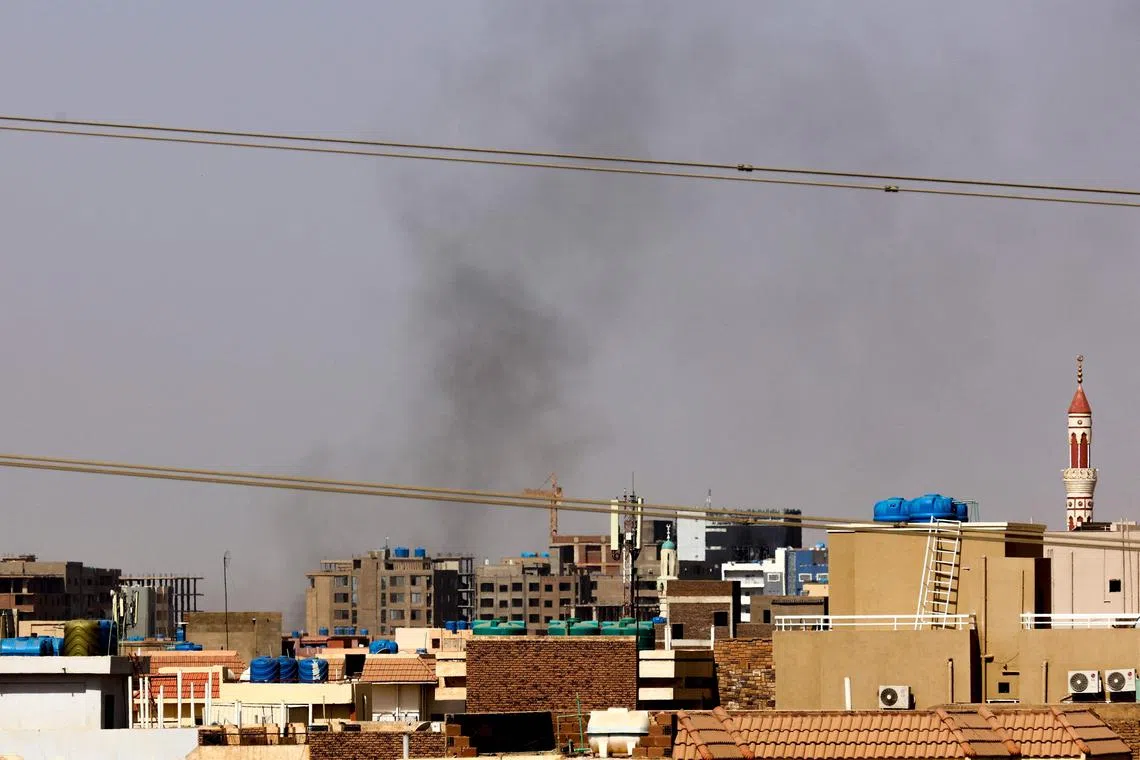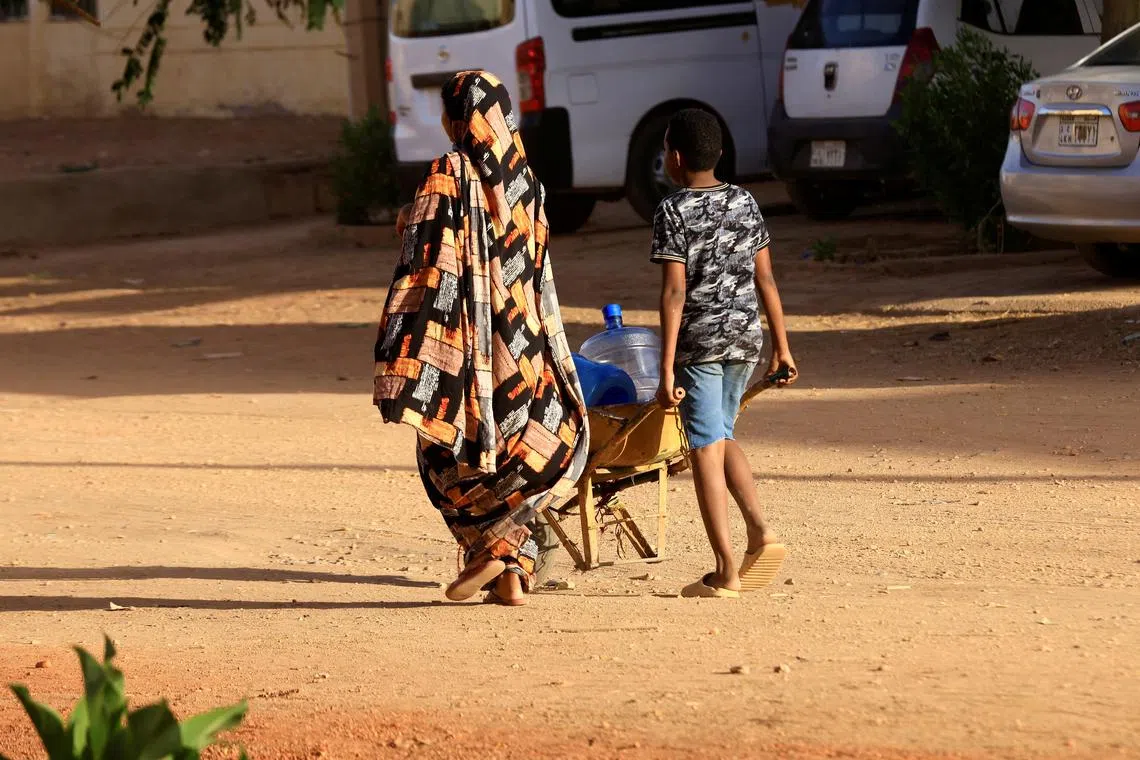Fighting in Sudan enters a second week as truce breaks
Sign up now: Get ST's newsletters delivered to your inbox

Smoke billows over residential buildings in eastern Khartoum during ongoing battles on April 22, 2023.
PHOTO: AFP
Follow topic:
KHARTOUM - Fighting in Sudan’s capital entered a second week on Saturday as crackling gunfire shattered a temporary truce
Overnight, the heavy explosions that had previously rocked the city in recent days had subsided.
But on Saturday morning, bursts of gunfire resumed.
Violence broke out on April 15 between forces loyal to army chief Abdel Fattah al-Burhan and his deputy turned rival Mohamed Hamdan Daglo, who commands the powerful paramilitary Rapid Support Forces (RSF).
The former allies seized power in a 2021 coup but later fell out in a bitter power struggle.
The army announced on Friday it had “agreed to a ceasefire for three days” for the Eid al-Fitr holiday that marks the end of the Muslim holy month of Ramadan.
A day earlier, UN Secretary-General Antonio Guterres and US Secretary of State Antony Blinken had called for the truce.
Mr Daglo said in a statement he had “discussed the current crisis” with Mr Guterres, and was “focused on the humanitarian truce, safe passages, and protecting humanitarian workers”.
Two previous 24-hour ceasefires announced earlier in the week were also ignored.
The fighting has seen the RSF take on the regular army, with neither side seemingly having seized the advantage.
The RSF is a force tens of thousands strong.
It formed from members of the Janjaweed militia that led years of violence in the western Darfur region.
‘Stench of blood’
In Khartoum, a city of five million people, the conflict upended the lives of civilians, who have sheltered in terror inside their homes without electricity in baking heat for days.
Many civilians have ventured out only to get urgent food supplies or to flee the city.
Eid is meant to be spent “with sweets and pastries, with happy children, and people greeting relatives”, resident Sami al-Nour told AFP. Instead, there has been “gunfire and the stench of blood all around us”.
Khartoum has seen some of the fiercest battles – with fighters jets launching air strikes, tanks prowling the streets and gunfire in densely populated districts.
But violence has also exploded across the country.
Late Friday, the army accused the RSF of attacks in the capital’s twin city of Omdurman where they released “a large number of inmates” from a prison, accusations the group denies.
Battles have also raged in Darfur, where Doctors Without Borders (MSF) in the city of El Fasher said their medics had been “overwhelmed” by the number of patients with gunshot wounds, many of them children.
Embassies ready for evacuation
Plans are being made to evacuate foreign nationals.
The United States, South Korea and Japan are deploying forces to nearby countries and the European Union is weighing a similar move.
On Friday, the US State Department said the situation was still too risky for an evacuation of embassy personnel.
Later, the RSF said it was ready to “partially” open “all airports” in Sudan to evacuate foreign citizens, although it is not possible to verify which airports they control.
In a Saturday statement, Sudan’s army said Mr Burhan had received calls from leaders of multiple countries to “facilitate and guarantee safety for evacuating citizens and diplomatic missions”.
It noted that the evacuations are expected to begin “in the coming hours”, adding that the US, Britain, France, and China are planning to airlift their nationals out of Khartoum using military jets.
Saudi Arabia evacuated its mission in the country, with staff heading to Port Sudan in the east and from there to the kingdom, the army said.
Jordan is planning a similar evacuation.
The World Health Organization (WHO) said 413 people had been killed and 3,551 wounded in the fighting across Sudan.
The actual death toll is thought to be higher, with many wounded unable to reach hospitals.
More than two thirds of hospitals in Khartoum and neighbouring states are now “out of service”, the doctors’ union said. Others have been looted, and at least four hospitals in North Kordofan state were shelled.

Many civilians have ventured out only to get urgent food supplies or to flee Khartoum.
PHOTO: REUTERS
The World Food Programme said the violence could plunge millions more into hunger in a country where 15 million people – one third of the population – need aid.
Analysts fear countries across the region risk being dragged into the conflict.
The International Crisis Group (IGC) has warned urgent steps were needed to stop a descent into “full-blown civil war”.
Mr Burhan and Mr Daglo’s dispute centred on the planned integration of the RSF into the regular army, a key condition for a deal aimed at restoring Sudan’s democratic transition.
The military toppled autocratic president Omar al-Bashir in April 2019 following massive protests against his three decades of iron-fisted rule.
In October 2021, Mr Burhan and Mr Daglo joined forces to oust a civilian government installed after Mr Bashir’s downfall, derailing an internationally backed transition to democracy.
Mr Daglo now says the coup was a “mistake” that failed to bring about change, while Mr Burhan believes it was “necessary” to include more groups into politics. AFP

